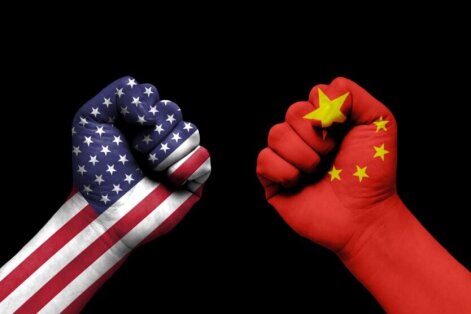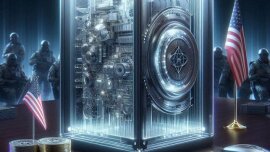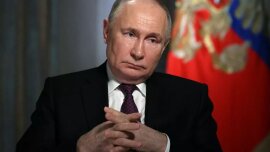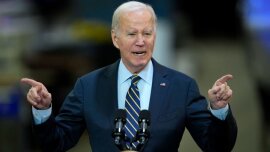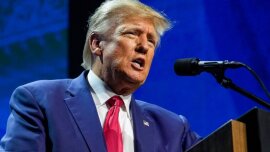This is an article by American realist political scientist John Mearsheimer, published in the November 2021 issue of Foreign Affairs, an analytical journal on international relations. But why should we, Ukrainians, pay attention to this work of an American scientist? For three reasons.
First , Professor Mearsheimer is the founder of offensive realism, which implies that states always try to increase their influence in the international arena to ensure their own security. The level of a country's security depends on how much it can convince opponents of its strength. Real power, not populism, is the foundation of a successful country.
Secondly, the American intellectual has been analyzing Ukraine for a long time. Back in 1993, he called for giving Kyiv the opportunity to abandon nuclear weapons; otherwise, he predicted: there would be an armed attack by Russia. And so it happened. Moscow's aggression and irritation correlates with our desire to become a part of the EU and NATO. The Kremlin cannot allow this due to its strategic security considerations. That was personally confirmed by Russian President Putin at a press conference the day before yesterday. John Mearsheimer calls the Western policy towards Ukraine "irresponsible": "Washington should not try to include Ukraine in NATO, but should help it to succeed as a buffer state between NATO and Russia."
Third, today the global focus has shifted to US-China competition. We already wrote about it here . Ironically: it was the United States that helped China to become powerful (although from the point of view of Beijing, it rose through its own efforts - and this is also true. The Chinese plowed hard for their own success). But now China is a fundamentally different civilization with its own foundations, preparing to become a world leader. At least economically. The United States is losing the competition so far. They are trying to drag Ukraine into this confrontation - but is it our war? How can we position ourselves against the backdrop of a global storm in line with our national interests in the best way? Is the "big deal on Ukraine" between the Russian Federation and the United States behind our backs in order to lure Russia to the side of the West in its confrontation with China? By the way, this is what Moscow wants, constantly raising stakes.
We can get some understanding from John Mearsheimer. He analyzes in detail the ontology and contours of the rivalry between Beijing and Washington. This is today's tough US view of the problem.
Fateful choice
Thirty years ago, the United States won the Cold War. The only great power on the planet remains. Studying the immediate horizons for potential threats, American politicians were not worried - especially about China - a still weak country that, together with America, opposed the USSR. But there were some ominous signs: China's population is five times that of the United States, and Chinese leaders are actively pursuing economic reforms, lifting the country out of poverty. Population size and wealth are the foundation of military strength. Therefore, there was a possibility that the PRC would become much stronger in a few decades. Realizing that a strong China would challenge American positions in Asia and around the world, the choice for Washington was simple: slow China's growth.
Instead, the United States hastened it. Sweetly deceived by theories about the inevitable triumph of liberalism and the end of great power competition, Democrats and Republicans promoted engagement policies. This helped China become even richer. Washington invested in the PRC, helped become part of the global trading system (WTO). Washington naively believed that this would gradually transform China into a peaceful democracy and a responsible player in the American liberal world order.
Of course, these fantasies never came true. Far from both liberal values at home and the US-proposed status quo in international relations, China has become increasingly ambitious and tough as it grows. Instead of achieving harmony between Beijing and Washington, the policy of economic engagement has led to rivalry and the collapse of the unipolar system. Today, Cold War 2.0 has broken out between the two giants - an all-encompassing competition in all areas of interaction amid concerns about their own security. A clash with China will test the resilience of the United States. The PRC is clearly stronger than the USSR. Moreover, due to completely different civilizational perceptions, this cold war can become hot.
This state of affairs is not a surprise - China is behaving exactly as predicted by realism. Who can blame the Chinese leaders for wanting to dominate Asia and become the most powerful power on the planet? Definitely not the United States. Washington gained hegemony precisely on such an agenda - first becoming a regional leader, and then the most fortified and influential country in the world. And today America is acting as predicted by the logic of realism. Deprived of competition with other real regional hegemons, America sees an ambitious China as a direct threat and is about to stunt its growth. The inevitable result is competition and conflict. This is the tragedy of great-power politics.
However, such a rapid rise in China could have been avoided. If American politicians operated with a balance-of-power policy during unipolar hegemony, they would try to stem China's growth by maximizing the power gap between Beijing and Washington. But once China became rich, a cold war between the US and the PRC became inevitable. Engagement policy was the worst strategic miscalculation made by any country in recent history: there are no such examples when a great power actively promoted the growth of a rival. It's too late to do anything now.
Realism 101
After the Sino-Soviet rift in the 1960s, American leaders - shrewdly - worked to integrate China into the Western order and helped it rise economically. They believed that a stronger China would help contain the USSR. But after the end of the Cold War, the question arose - what should American politicians do with China, which was no longer needed as Moscow's balancer? Chinese GDP per capita was 75 times less than the American one. Given a sharp economic growth, a one and a half billion China could economically outgrow the United States. In short, the result of China's rapidly becoming wealthy has had enormous implications for the global balance of power.
From a realist perspective, China's outlook as an economic giant was dire. This not only meant the end of unipolarity, but also the inevitable growth of Beijing's military strength. Because densely populated and rich countries always turn economic power into military power. And then China can use it, striving to become the leader of Asia. And in parallel, promote their interests and influence in other parts of the world. Once China has shown its power, the United States has no choice but to contain the PRC by launching a dangerous confrontation in the field of global security.
Why are great powers doomed to compete?
First, there is no higher authority that resolves disputes between them or protects them when threatened.
Second, no great power can be sure that a rival - especially a militarily powerful one - will not attack. It's hard to predict your opponent's intentions. To become the strongest is what countries consider the best way to survive in an anarchic world. In practice, this means hegemony in your region. With the further application of all efforts so that other great countries do not increase their influence in it.
Making China a great power was a surefire way to create problems
The logic of realism has been inherent in American foreign policy from the very beginning. Early presidents and their successors worked furiously to make the United States the most powerful nation in the Western Hemisphere. After becoming a regional hegemon in the early 20th century, the United States played a major role in preventing the regional domination of four great powers by defeating: 1) Imperial Germany in World War I. 2) Nazi Germany and Imperial Japan in World War II; 3) USSR in the Cold War. The United States feared the rise of these potential hegemons. In the future, they could try to enter the "fiefdom of the United States" - the Western Hemisphere, as well as prevent the global spread of American influence.
China follows the same logic, effectively imitating the United States. Beijing wants to become the strongest in its region and then in the world. They want to build a solid ocean-going fleet to protect its access to the hydrocarbons of the Persian Gulf. They want to become a major manufacturer of high-tech products. They want to create a world order that would serve their national interests. It would be foolish of a strong China to miss the opportunity to achieve these goals.
Most Americans (and Ukrainians too, unfortunately - note) do not understand that Beijing and Washington are using the same strategy. The people firmly believe that the United States is a noble democracy that operates in a different way than authoritarian countries. But international politics doesn't work that way. All great powers, democracies or not, have no choice but to compete for global power in a zero-sum game. This imperative was guided by the United States and the USSR during the Cold War. It is thanks to this imperative that the United States today is determined to contain China.
Realism highlights the structural forces underlying great power competition. Even after rejecting his logic, American leaders still need to realize that China's transformation into a great power was a sure way to create problems. China has long fought with India to resolve border disputes on favorable terms, and also had revisionist goals to regain leadership in Asia. Beijing has constantly declared about: 1) Taiwan's reintegration; 2) the return of the Diaoyu Islands (钓鱼岛diào yú dǎo), which Japan considers "its own"; 3) complete control over the South China Sea. All these goals are met with opposition from the Chinese neighbors and the United States itself. Beijing, with a long historical memory, has always had ambitions - it was a mistake for Washington to allow it to become strong enough to start realizing them.
The road we didn't take
If the American establishment were to embrace the logic of realism, there would be specific policies to slow China's economic growth and maintain the gap between the national wealth of the United States and the PRC. In the early 1990s, the Chinese economy was still undeveloped, and its growth depended on access to American markets, technology, capital. The economic and political Goliath of the day, the United States, was in an ideal position to hold back China's growth.
In the early 1980s, US presidents guaranteed the PRC most favored nation status. It gave the country the best trading conditions with America. This predisposition should have ended with the end of the Cold War, and Washington should have initiated a new bilateral trade treaty with tougher terms for China. The US should have done this even if conditions were worse for America: given the smaller size of the Chinese economy at the time, it would have suffered more losses than the US. Instead, the presidents gave China the most-favored-nation trade every year. In 2000, the error was supplemented by the consolidation of the status as permanent. This noticeably reduced the level of Washington's influence on Beijing. The following year, the United States lobbied for China's entry into the WTO. Having gained access to global markets, China began to conquer them. Its products became more competitive, and the country itself became stronger.
In addition to limiting China's access to the world market, the United States had to strictly minimize the export of sophisticated American technologies to the PRC. Export controls were supposed to be especially effective in the 1990s and early 2000s. Back then, Chinese companies basically copied Western technologies without inventing their own. If China did not have access to technologies in such complex sectors as aerospace and electronics, this would significantly slow down its economic growth. But Washington allowed technology to enter China. This allowed the PRC to challenge the US dominance of innovation. Another miscalculation from American politicians: it was allowed to export capital to China. If in the early 1990s. it is tens of billions of dollars of investment, then ten years later there were already hundreds.
If the US restricted trade and investment, China would look to other countries for help. But in the 1990s. there were limits to which Beijing could develop cooperation with others. Of course, not only the United States manufactured sophisticated products and technologies, but it was they who had the right to effective sanctions and provided security guarantees - in this way they would influence the cooperation of other countries with China. As part of the containment of the PRC in global trade, Washington could "activate" allies - Taiwan and Japan, reminding them: a strong China is an existential challenge for them.
Given market reforms and universal unlocking of potential, China would still continue to grow. But it would have become a great power much later. And by that time, it would still be weaker than the United States. Beijing would not seek to become a regional leader.
It is relative, not absolute, strength that plays a key role in international politics. Therefore, the logic of realism presupposes that American politicians should, firstly, slow down China's economic growth. Second: start a self-development campaign to maintain global economic leadership. The US could invest heavily in research and development while maintaining the US's unique position as a technology leader. This would have prevented the movement of manufacturing to China and supported the American industrial base. The US economy would be protected from the formation of vulnerable production chains. But none of these judicious measures was taken.
Delusional thinking
Given the belief in the superiority of liberal theories that swept the Washington establishment in the 1990s, it was unlikely that realist thinking would be present in American foreign policy. Instead, the United States assumed that global peace and economic prosperity would be maximized by spreading democracy, promoting an open international economy, and strengthening international institutions. In the case of China, this logic found expression in the policy of economic engagement. America hoped that by integrating the PRC into the global economy, Beijing would gradually become a human rights democracy and a responsible global player. Unlike realism, which feared China's growth, liberalism welcomed it.
China's economic involvement is a risky policy, but it has been supported by 4 administrations. George W. Bush was committed to engaging with the PRC even before the end of the Cold War. He stated that "commercial contacts between the United States and China contribute to the spread of freedom" and "the democratization of China is inevitable." When he opened up most-favored-nation trade for China, he was criticized, but he retorted: "It will help create a climate for democratic change."
Bill Clinton criticized Bush Sr. for "lisping" with the PRC before the 1992 elections. He really tried to play tough against Beijing. But only at the beginning of the cadence. Already in 1994, Bill Clinton said: "The United States must strengthen its involvement with China, this will help it become a responsible power, even human rights will be respected." It was Clinton who pushed through Congress to grant the PRC permanent most-favored-nation treatment in trade and contributed to China's entry into the WTO.
George W. Bush continued the Clinton policy - China was helped to become a full-fledged part of the world economic system. The president was confident that "trade with China will promote freedom."
The Obama administration has followed a similar line. “Once I became president, my goal was to constantly engage economically with China, manage our differences, and maximize opportunities for collaboration,” Obama said in 2015. "And I keep saying that I believe that it is in the interests of the United States that China is growing." One might think that the "pivot to Asia" led by then-head of the State Department, Hillary Clinton, was against China - but this is not so. Ms. Clinton has been a staunch supporter of China's economic engagement. This is confirmed by her article in Foreign Affairs magazine. Hillary Clinton writes about the liberal agenda, open markets: "a prosperous China is good for America." Aside from deploying 2,500 Marines in Australia, Obama and Clinton did nothing more to contain China in the region.
Support for the engagement strategy has been overwhelming among American businesspeople. They saw China as a manufacturing base and a huge market - over one and a half billion consumers. Trade groups like the American Chamber of Commerce, Business Roundtable, and the National Association of Manufacturers signed up to what Thomas Donahue - then head of the chamber of commerce - called "an endless blitzkrieg of lobbying" - continually helping China become a WTO member. The media promoted an agenda for engagement, such as The Wall Street Journal, The New York Times, and The Washington Post. The academic community was in favor of engagement too, with few researchers questioning the policy of helping China grow stronger. Two aksakals of American foreign policy - Zbigniew Brzezinski and Henry Kissinger supported this strategy.
Inclusion advocates admitted that their policies could fail. Bill Clinton noted in 2000, "we do not know where this will lead", and Bush Jr. said at the same time: "there are no guarantees." However, such doubts were extremely rare. More importantly, none of the elite predicted the consequences of the failure. They believed that if China refused to democratize, it would simply be a less capable country. The prospect that the PRC would become stronger and no less authoritarian did not appear in their calculations. In addition, American politicians believed that realpolitik thinking was outdated.
Today, some advocates of engagement insist that the US was hedging its interests: in parallel with economic engagement, China was contained. “To be on the safe side… we have pursued a policy of containment if engagement fails,” wrote Joseph Nye, who worked at the Pentagon during the Clinton administration. This statement contradicts the rhetoric of American politicians who have argued that they are not holding back China. In 1997, for example, Clinton described his policy as "not restraining or conflicting" towards the PRC. But even if the United States quietly contained China, economic engagement completely prevailed - a fundamental shift in the global balance of power took place in China's favor. Creating your own competitor is not comparable to containing it.
Failed experiment
As time has shown, the engagement strategy was a failure. The Chinese economy has made an unprecedented leap forward, but the country has not transformed itself into a liberal democracy or "a responsible glass holder (a player interested in maintaining the current international order)." On the contrary, Chinese leaders see liberal values as a threat to their country's stability. And they, as the leaders of the rising powers usually do, have a tough foreign policy. We must admit that economic involvement was a colossal strategic mistake. Kurt Campbell and Eli Ratner - two former Obama administration officials who admitted that engagement had failed and those in the Biden administration today - write: "Washington is now facing the most dynamic and formidable contender in modern history."
Obama has announced a tougher line on Beijing, challenging its naval claims and filing bids against it at the WTO. But these half measures meant nothing. Only in 2017 did the policy really change. After Donald Trump became president of the United States, he quickly abandoned the engagement strategy that had been practiced by four previous administrations. In return, he implemented containment of China. As stated in the White House strategy published that year, the era of great power competition has returned. The PRC has been identified as "challenging American power, influence and interests and trying to undermine American security and prosperity." In order to pass the baton of containment to his successor (Joe Biden), Trump launched a trade war in 2018 and tried to weaken tech giant Huawei and other Chinese corporations. In his opinion, they posed a threat to American technological domination. In parallel, the Trump administration has developed a closer relationship with Taiwan and challenged Beijing's claims in the South China Sea. Cold War 2.0 has begun.
Some might have expected President Biden to stop containment and return to China's involvement, as he has consistently supported this policy as head of the Senate Foreign Relations Committee in the Obama administration. But as president, he inherited containment and continued a realistic course towards China. Like its predecessor. At the beginning of his tenure, Joe Biden announced about "tough competition" with China. Congress supported it. In June 2021, the Senate passed the U.S. Innovation and Competition Act with bipartisan support. The act calls China “the greatest geopolitical and geoeconomic challenge for American foreign policy” and calls for Taiwan to be treated as a sovereign state, which is “vital” for the United States. The American public shares these views: a 2020 Pew Research Center poll found that nine out of ten Americans perceived China as a threat. The newest US-China rivalry will not end anytime soon. On the contrary: it will intensify, regardless of who is in the White House.
The danger of a hot war
Remaining proponents of the engagement strategy now portray the downward spiral of US-China relations as a product of the "warriors of a new Cold War," in the words of former Bush administration official Robert Zoellick. From their point of view, the incentives for further economic cooperation with China outweigh the need for geopolitical competition. Common interests trump conflicting interests. Tragically, the advocates of engagement just shake the air. Cold War 2.0 is here. Comparing the two Cold Wars, it becomes clear that US-China rivalries are more likely to result in gunfire than US-Soviet ones.
First, there is a difference between the capacities of the PRC and the USSR. China has moved closer to the United States in terms of relative strength than the USSR had ever been. At the height of its power, in the 1970s, the Soviet state had a slight advantage over the United States in terms of population (1.2 to 1). The wealth of the USSR, according to the gross national income indicator, was only 60% of that of America. The population of China today is four times that of the United States, and its wealth is 70% of that of America. If the Chinese economy continues to grow at the same rate (5-6% per year), it will overtake the US and have more relative strength. It is predicted that in 2050 China's population advantage over the United States will be 3.7 to 1. If per capita income in China by then is half that of America's - as it is in South Korea today - then China will be 1.8 times richer than the United States. And if the Chinese try and their income equals 60% of the American - as in today's Japan - then the PRC will be 2.3 richer than America. With this potential at hand, Beijing will undoubtedly be able to build a stronger army than the American one, which, moreover, will oppose China from a distance of 6,000 nautical miles.
Second, the USSR was not only poorer than the United States at the height of the Cold War, but it was still recovering from the terrible devastation caused by the Second World War unleashed by Nazi Germany. The USSR lost: 1) 24 million people; 2) 70,000 cities and villages; 3) 32,000 enterprises; 4) 40,000 km of railway track. Of course, it could not compete normally with the United States. China, on the contrary, last took part in the war in 1979 against Vietnam, and then only increased its power, becoming an economic titanium.
Thirdly , the USSR had a kettlebell in the form of problematic allies - something that today's China does not have. Throughout the Cold War, the councils supported a huge military presence in Eastern Europe and became deeply entangled in the internal political situation of every country in the region. Moscow wasted resources managing discontent in East Germany, Poland, Hungary, and Czechoslovakia. Albania, Romania, and Yugoslavia have alternately challenged the USSR's economic doctrine and security policy. The Soviets were also involved in China before it switched sides at the height of the Cold War. All of these allies were yoke around the neck of the USSR, which distracted Soviet leaders from competing with a principled opponent: the United States. Of course, modern China has several allies, especially North Korea, but Beijing is still less attached to them than Moscow was to its own. China is more flexible.
What about ideology? Like the USSR, China is run by a nominally communist government. But just as America wrongly perceived the USSR during the Cold War as a distributor of communist doctrine, so it would be a mistake to perceive China as an ideological threat today. Soviet foreign policy was only partially influenced by communist thinking; Joseph Stalin was a firm realist, like his predecessors. In modern China, communism plays an even smaller role: the PRC is an authoritarian country that uses capitalism. The Americans would like China to be communist, then it would have a weak economy.
But China is a real adherent of one "ism" carried to an extreme degree. It is destined to intensify competition with the United States. This is nationalism. In principle, the most powerful political ideology in the world, nationalism was limited in the USSR - it contradicted communism. However, Chinese nationalism has only intensified since the early 1990s. What makes it especially dangerous is its emphasis on the “centennial humiliation of China” (百年 国耻bǎi nián guó chǐ) - the period since the beginning of the First Opium War, when China was defeated by the great powers, especially Japan. According to the Chinese narrative, the United States is also on the list of “offenders”. The effect of nationalism was clearly manifested in 2012-2013, when conflicts between China and Japan intensified over the right to possess the Diaoyu Islands. Anti-Japanese protests erupted in the PRC. In the near future, heightened security rivalry in East Asia will fuel Chinese animosities against Japan and the United States, increasing the likelihood of a hot war.
China's regional ambitions also increase the chances of war. Soviet leaders were busy rebuilding after World War II and running the empire in Eastern Europe. They wanted to maintain the status quo on the continent. China, by contrast, has an expansionist agenda in East Asia. Beijing's core goals have important strategic value, but they are also sacred territory for Chinese nationalism. This is especially true of Taiwan: the emotional attachment of the PRC to the island is much stronger than that which the advice to Berlin had. Thus, Washington's promise to defend Taiwan becomes increasingly risky.
Further, the geography of the new Cold War is more warlike than the previous one. Although the US-Soviet rivalry was global, its center of gravity was the Iron Curtain in Europe, where the two powers had huge armies armed with thousands of nuclear missiles. The chances of unleashing a superwar in Europe were negligible. Politicians on both sides understood the dire risks of nuclear escalation. None of the leaders wanted to start a conflict that would destroy his own country.
In Asia, there is no clear line like the Iron Curtain. Instead, there are many potential conflicts. They can lead to the use of non-nuclear weapons - this makes the war real. Risks include: no-fly zone over the Taiwan Strait, South China Sea, Diaoyu Islands, sea routes between China and the Persian Gulf. These conflicts will take place in open waters between the enemy Navy and Air Force. If the goal is to capture an island, ground forces will also take part. Even the battle for Taiwan, where it is possible that Chinese troops will be used, theoretically will not lead to a clash of huge armies armed with nuclear weapons.
Nothing now suggests that these limited war scenarios will necessarily come true, but they are more realistic than the big war between NATO and the Warsaw Pact countries at the time. Moreover, it cannot be argued that there will be no nuclear escalation between Washington and Beijing. For example, because of Taiwan or the South China Sea. In fact, if one side loses dramatically, it may allow the use of nuclear weapons in an effort to reverse the situation. There could be an attack by nuclear missiles at locations far from China or the United States, suggesting that this would not lead to the risk of further escalation. In Cold War 2.0, not only war between great powers is possible, but also the use of nuclear warheads.
America's welfare rival
While economic performance is deteriorating, proponents of engagement remain - they think the US can find common interests with China. In July 2019, 100 American Sinologists wrote an open letter to Trump and members of Congress, rejecting the idea that the PRC was a threat. "Many Chinese officials and other elites know that moderate, pragmatic and sincere cooperation with the West serves China's interests," they wrote, urging Washington to "work with our allies to create a more open and prosperous world in which China has a place."
But great powers are reluctant to let their competitors grow stronger at their expense. The driving force of opposition is structural. Problems cannot be solved by smart policy. The only opportunity that can change the dynamics is a dramatic crisis undermining China's unrelenting growth. But in view of China's stability, internal stability, economic reserve, a crisis seems unlikely. Therefore, dangerous security competition between great countries is inevitable.
The best thing that can be done in the face of this rivalry is to avoid the outbreak of war. Washington will need to maintain significant forces in East Asia, convincing Beijing that an armed confrontation will be a Pyrrhic victory. The realization of opponents that they will not be able to achieve quick victory prevents wars. Next, American policymakers should constantly remind themselves - and Chinese leaders - of the widespread likelihood of nuclear escalation. Nuclear weapons are ultimately the final deterrent. Washington can also set clear rules for security competition. For example, agree to avoid random armed confrontations. If each side understands what the crossing of the opponent's red lines means, the likelihood of war will decrease.
These measures can only minimize the dangers of growing US-China rivalry. But this is the price the United States must pay for ignoring the logic of realism and turning China into a powerful state that has now challenged the United States on all fronts.
Tags: Petr Shevchenko / China / US-China relations / Bill Clinton / Barack Obama / George W. Bush / George W. Bush / Donald Trump / Xi Jinping / John Mearsheimer / Russia-China relations / Russia-US relations
